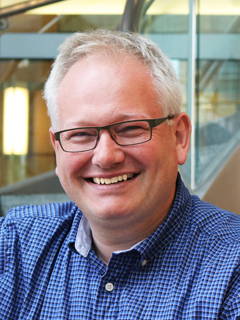HOW CAN WE HELP YOU? Call 1-800-TRY-CHOP
In This Section

Dr. Grant uses high-throughput genotyping and sequencing technologies, combined with statistical and bioinformatic approaches, to unravel genomic puzzles related to multiple common complex traits.
Bio
Dr. Grant serves as a director of the Center for Spatial and Functional Genomics, which has been conducting human genomics research for more than 20 years. The highlights of his career include the discovery of the polymorphic Sp1 site in the COL1A1 gene and its association with osteoporosis, the identification of variation in the TCF7L2 gene playing a key role in conferring type 2 diabetes risk, and providing leadership in an international genetics effort to characterize genes influencing birth weight and common childhood obesity risk.
He has also previously played a role in uncovering genes involved in other traits, including cleft lip with or without palate, scoliosis, inflammatory bowel disease, autism, attention-deficit/hyperactivity disorder, head circumference, intracranial volume, myocardial infarction, pediatric eosinophilic esophagitis, type 1 diabetes, asthma, multiple sclerosis, and neuroblastoma.
Current work by Dr. Grant and his team primarily involves investigating disease genomics with a specific focus on pediatrics. Using high-throughput genotyping and sequencing technologies, combined with statistical and bioinformatic approaches, his goals include unraveling genomic puzzles related to childhood obesity, pediatric bone strength determination, early onset diabetes and cancer. These phenotypes are known to be strongly determined by genetic factors; however, resolving genomic contributors to such complex phenotypes in adults has been impeded by interaction with strong environmental factors. Distillation of the genomic architecture in these complex traits should be easier to determine in children, where the relatively short period of their lifetime limits the impact of environmental exposure.
Given the global prevalence of such diseases, prevention of these disorders and their serious complications must be addressed in order to reduce individual morbidity and the economic burden on society.
Education and Training
BSc, University of Aberdeen, UK (Genetics), 1991
PhD, University of Aberdeen, UK (Genetics), 1996
Titles and Academic Titles
Co-Leader, Spatial and Functional Genomics Research Affinity Group
Director, Center for Spatial and Functional Genomics
Daniel B. Burke Endowed Chair for Diabetes Research
Professor of Pediatrics
Professor of Pediatrics in Genetics
Professional Memberships
American Society of Human Genetics, 2008-
Early Growth Genetics Consortium (EGG), 2009-
American Diabetes Association, 2009-
American Society of Bone and Mineral Research, 2010-
Society of Pediatric Research, 2016-
Professional Awards
Young Investigator Award, American Society of Bone and Mineral Research, 1995
Russell A. Hibbs Basic Science Award, Scoliosis Research Society, 2011